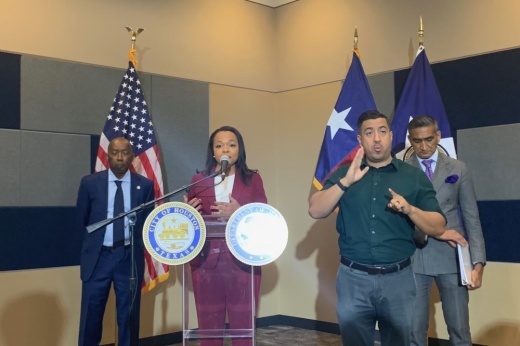Just under one year after the U.S. Department of Justice announced it was opening an investigation into the city of Houston over how it responds to illegal dumping complaints, officials with the city and the department have announced a resolution ending the investigation and laying out how the city will work to address issues related to heavy trash being left in public spaces.
The investigation dealt with potential Civil Rights violations based on alleged discrepancies in how quickly the city responded to dumping complaints in communities of color, namely Trinity Gardens. Houston Mayor Sylvester Turner announced the resolution at a June 6 news conference alongside DOJ officials, adding that the issue was a personal one to him.
"I grew up and still live in these neighborhoods, and my life's work has been to lift these neighborhoods. As mayor, I prioritized the needs of communities of color that are historically under-resourced and underserved and built a Complete Communities program that is a model for public-private investment in neighborhood revitalization," Turner said in a statement. "With this voluntary resolution, we agree with the Department of Justice to move together as partners towards a solution."
The overview
The resolution adds to an $18 million commitment Turner announced in March called One Clean Houston, which laid out a plan to combat illegal dumping through rapid cleanup, better enforcement and educating the public. The resolution announced June 6 "memorializes the city’s cooperation with the Justice Department," according to a news release. Beyond One Clean Houston, the resolution requires the city to evaluate:
- An enforcement and educational outreach plan to address commercial sources of illegal dumping
- Detailed planning regarding community outreach
- Additional strategies to address limitations and restrictions regarding the use of the city's six neighborhood depositories, including challenges that may be caused by documentary requirements and materials accepted
- The adoption of an ordinance that would require certain large residential construction or rehabilitation projects to obtain a dumpster on the project site
- The adoption of a permit fee related to solid waste management
The context
Illegal dumping can lead to a wide range of woes in the communities where it occurs, said Kristen Clarke, assistant attorney general with the DOJ's Civil Rights Department. Most significantly, it can contaminate water, attract rodents and other vermin, and worsen flooding by clogging drainage infrastructure. With the conclusion of its 10-month investigation, DOJ officials said they are not issuing any findings on whether the city's practices were racially discriminatory.
What's been done
Part of the city's efforts so far have involved spending more on contracts for illegal dumping cleanup and litter collection. The city's Solid Waste Department has reduced response times to illegal dumping complaints by 75% when compared to this point last year, Turner said, from 49 days on average to 11 days on average. The city has cleared 20,000 tons of debris from illegal dumpsites so far this year, a 20% increase from what had been cleared at this time last year, Turner said. There have also been 110 criminal cases related to illegal dumping this year, or four times more than the number of cases at this time last year.
What they're saying
"This agreement will ensure that Houston fully addresses chronic illegal dumpsites, provides access to adequate waste management services and improves quality of life in communities of color," Clarke said. "The Justice Department will continue advancing environmental justice and ensuring that people of color across our nation live in safe, clean and healthy communities."
Another perspective
Amy Dinn is litigation director with Lone Star Legal Aid, a group that provides advocacy and legal representation to low-income Texans. LSLA filed the complaint with the DOJ that led to the Civil Rights investigation.
Dinn said she was glad to see the city's commitment to greater financial investments and better enforcement of illegal dumping sites, but added that illegal dumping was only one piece of the initial complaint. The full complaint also laid out other ways that historically underserved communities are left behind, including the alleged ineffective regulation of industrial facilities in residential communities, lack of access to municipal services and outdated drainage ditch infrastructure. Moving forward, Dinn said the effectiveness of the resolution will depend on how much the city engages residents and allows for their continued participation in the conversation.
"I think this really should be a cause for celebration across the city that we can get this right," Dinn said of the resolution. "[The city] demonstrated through the data collected they can pick up trash. This isn’t an insurmountable thing."
What's next
The DOJ will monitor the city's progress for the next three years. City officials have also emphasized the important role the community plays in combating illegal dumping and how education efforts will be part of the solution. Turner announced June 6 the release of community toolkits in multiple languages that are meant to help guide community members on how they can tackle the issue through canvassing and organizing events.





